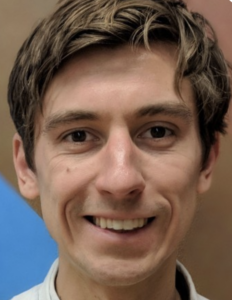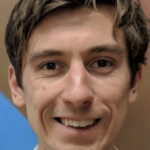
From left: Alanah Cleare ’25, junior Owen Wheeler; and senior Chloe Adler review recently captured footage for a project in this year’s Arts, Humanities and Social Sciences Summer Institute(AHSSSI). Photo by Karen Pearlman.
The mini-movie she made with her teammates shows Alanah Cleare falling asleep while studying in the University of Mary Washington’s Hurley Convergence Center. In the AI-assisted dream sequence that follows, she awakens on Campus Walk surrounded by fantastical fruit – talking pineapples and combustible berries that swirl up to the sky and explode in a rainbow.
The ethereal composition was created by UMW junior Owen Wheeler and senior Chloe Adler, along with Cleare, who graduated from UMW in May but returned this summer to take part in a faculty-guided research opportunity. The group was led by Assistant Professor of Communication and Digital Studies J.D. Swerzenski.
Their two-minute Berry Blasters movie was part of a project called “Cameraman vs. Machine,” designed to assess the value of artificial intelligence for student filmmakers. It was one of four presentations delivered last month at Mary Washington’s Arts, Humanities and Social Sciences Summer Institute (AHSSSI) Symposium. The fourth annual event – which also explored AI’s potential in creative writing, the role of eye movements in memory, and the evolution of phonological features – was the culmination of five weeks of scholarly summertime work.
“When we’d run into issues, Dr. Fallon would remind us that we were undergraduate students doing graduate-level research,” senior Michael Boehmcke told symposium spectators who gathered inside Combs Hall to hear the groups’ trials and tribulations, along with their triumphs. Read more.


